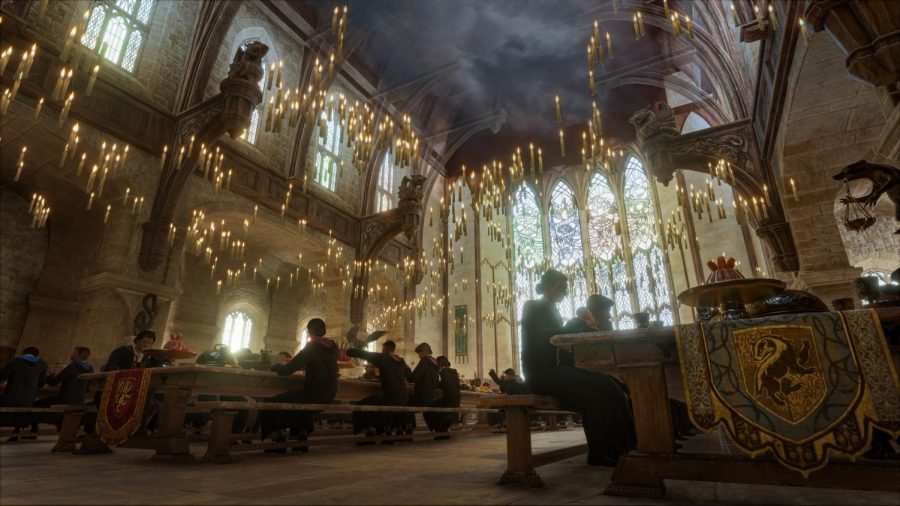“Harry Potter” Boycotts, the Game Industry, and the Public Voice
“Hogwarts Legacy” release prompts boycotts from trans activists and the internet is skeptical of their effectiveness.
March 27, 2023
“The Harry Potter” franchise recently made its first step into the gaming industry with “Hogwarts Legacy,” a high-budget fantasy experience finally released after years of delays from the pandemic. However, reactions to its release have been divided regarding the franchise’s association with “Harry Potter” author J.K. Rowling.
Rowling has a history of transphobic statements over the past years and has grown a controversial reputation. Recently, she has grown more vocal about her beliefs about transgender women, often expressing them to the public through Twitter. Beginning to identify herself as a trans-exclusionary radical feminist (TERF), she has publicly shared her controversial opinions in various ways, some less subtle than others.
As well as directly declaring her thoughts, Rowling has shown public support for anti-trans figures and conveyed her opinions through her writing. Published in 2020, Rowling’s recent “Troubled Blood” has sparked controversy throughout the internet landscape. Many take issue with the book’s inclusion of a serial killer who dresses up as a woman, a trope heavily criticized by trans activists and organizations.
Rowling’s suggestions that people should be concerned of trans women and the association of trans people and supporters with inherent violent tendencies can be explicitly seen in her public statements as well. She recently tweeted, “deeply amused by those telling me I’ve lost their admiration due to the disrespect I show violent, duplicitous rapists.”
Due to the “Wizarding World’s” connection to Rowling, many people have attempted to boycott the new release of Hogwarts Legacy on various levels. Many instances, the boycott of the new title is an individual decision of not wanting to support the game and the ways it will profit Rowling. Some attempt to raise awareness about the situation for others to make their own informed decisions.
However, many are questioning the effectiveness and necessity of these boycotts. Purchasing and endorsing “Hogwarts Legacy” does financially support Rowling, but she did not directly contribute to the game’s development. Furthermore, the game features the franchise’s first canonically trans character, although many argue that their inclusion was a token role in order to dampen controversy.
Ethical issues within the extensive game development process are very common in the industry, so what makes this controversy distinct?
Crunch culture, for example, has also had its fair share of Twitter discussions. During the process of game development, it is common for employees to work an excessive amount of overtime, “crunch,” to meet demand. Often crunch is technically optional, but this culture has fostered under the brutal weight of the industry. In order to keep their jobs or meet a deadline, “voluntary” crunch is inevitable, even if not explicitly told.
Workplace abuse and poor conditions in the industry is not limited to workload. Activision Blizzard, a giant in the gaming world, has a history of poor management of sexual harassment allegations and workplace discrimination. Allegations and discourse continued
“Hogwarts Legacy” is the most financially lucrative game ever released by Warner Brothers ever, amassing $850 million and selling 12 million copies in the first two weeks. Crunch culture still lives in the industry, and Blizzard continues to release massive titles, like “Overwatch 2.”
Upon seeing the data, some may scoff at the boycott attempts and Twitter discourse. However, it is no surprise that these corporations are performing well. The awareness spread about these issues has had its purpose, and many advocates knew this.
Unlike controversies such as the Blizzard allegations and crunch culture, the “Hogwarts Legacy” boycotts serve as caution to the consumers, not necessarily to make change within the industry itself.
As Rowling expresses her beliefs in a drastically vocal fashion, the franchise is forever stained with warnings for trans individuals. Customers who purchased “Hogwarts Legacy” are not necessarily transphobic. However, it is important to note that trans people might be at risk if interacting with those who actively ignore Rowling’s views and choose to participate in its community.
With the reputation she’s earned, it is difficult to separate the Wizarding World with its original author whenever conversation arises; the controversy was successful in that regard.
The online addressal of the industry’s internal issues like crunch culture and sexual discrimination have had their own success. Many companies such as Supergiant Games and Modern Wolf now act to prevent crunch in their workforce by scheduling deadlines and hours with the issue in mind. The Blizzard allegations eventually resulted in the company’s settlement of a $18 million lawsuit in 2022.
Spreading the word of course has its purpose in responding to both large and smaller scale ethical issues. The inherent processes of internet communication has its consequences, however, and the actual intention of movements is often lost in the transaction of online criticism.

